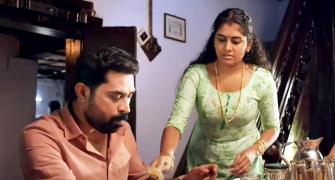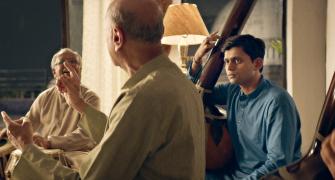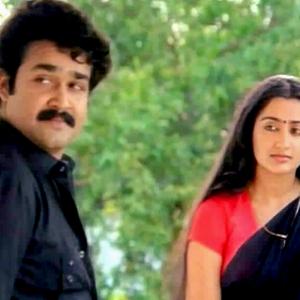If you think the film is gutsy, you are simply being blind to the truth that the whole men-are-worthless slant is saleable right now, argues Sreehari Nair.

The Great Indian Kitchen begins as a series of wide shots where Nimisha Sajayan is just one element among many to be observed.
As the film progresses, the camera moves closer and closer to her hassled face so that there is nothing to perceive but the extent and range of her hassles.
The title is determinedly ironic.
Director Jeo Baby wants to present the Indian Kitchen, not as a symbol of nourishment and familial warmth, but as a crucible that shapes the many bad habits of the privileged Indian male.
Baby's protagonist is a Bahrain-raised Malayali girl, who is married off into a big-ass Tharavad in Kerala and left tending to the insensitive men in the house.
The writer-director wants to use this setting to poke holes in the Ghar Ki Lakshmi spiel that is typically attached to the typical Indian housewife, but he doesn't seem to realise that by the end of the film, he has turned his leading lady into an infallible goddess of another kind.
Germaine Greer had once said that male artists are wont to defining women as either menials or goddesses, and Jeo Baby, here, doesn't stray too far from Greer's notion: he unwittingly betrays this characteristic of the privileged male artist.
The Great Indian Kitchen also banks heavily on the privilege of the times, and if you think it gutsy you are simply being blind to the truth that the whole men-are-worthless slant is saleable right now (So saleable it can even be termed a marketing ploy).
That said, Baby's technique and approach, in the early bits, may just be too advanced for anti-patriarchy warriors to derive from them slogans for their movement.
In these bits, what the film mocks, and subtly destroys, are those clichés of behaviour that turn the wheels of domesticity.
Nimisha Sajayan is the wife and Suraj Venjaramoodu is the husband, but it is made plain to us that they are engaged in acting out the rituals of matrimony.
The mating calls, the lovey-dovey asides, the coquettish reactions are all evocations of our popular culture, and the film keeps us aware of the artifice in their interactions.
Food, and the process of making food, we are shown, is the real thing, the fuel that keeps the engine of love running.
In these scenes, the mixing by Sinoy Joseph is masterly, and the sounds of everyday chores float above the spoken lines like grease above water.
The dialogues of the characters may be truisms, uttered to contextualize specific events (a wedding ceremony, a casual get-together), but the whistling of a cooker, the crackle of mustard in hot oil, a knife slicing a big hunk of meat, imageries like these fused with their respective sounds bring to us certain elemental truths.
We see the veins on the hands of the women popping out as they scrape away tapioca skin, and we see the men dispensing notes of affection as compensation for all those shriveled drumstick pieces they leave behind on the placemats.
The initial bits of The Great Indian Kitchen are constructed to highlight the contrast between love and the sweat-soaked effort that goes into upholding this love: the mushy talks keep pouring out, the cooker goes on whistling.
The greatness of Nimisha Sajayan's performance, in this section, is linked to her ability to wordlessly suggest how her character, a realist, slowly gets caught up in this trap-of-woe-baited-with-love.
On their first night, inside a well-lighted room, when her husband emits the cliché that is known to initiate the act of cozying up, when he asks her 'Are you afraid of darkness?' she looks at him with mirth.
Later, when she shuttles between the hall and the kitchen, between feeding her family and answering the hiss of a burning non-stick, her arms flail about schoolgirl-like, her tongue hangs out a little, and you know instantly that you are watching a person whose modernity, upbringing, and sense of self is being slowly drained out of her.
In wide shots, you catch flickers of frustration crossing her face, and you come to understand how her mother-in-law, the original Hercules of this household of inertia-afflicted men, must have gotten her perennial frown.
The mother-in-law, a minor character with major impact, is a beautiful creation: she is someone who has mastered the art of putting everyday irritations to constructive use -- to wrench open tight bottle caps, and to hack away at giant jackfruits.
And when this virtuoso of a housewife leaves for her pregnant daughter’s home, her suitcase, you can see, is topped with an Unniyappam-making pan.
In a movie that heaps its sympathies so wholeheartedly on its women, how do the men fare?
Suraj Venjaramoodu is good, but then he often is.
The movie doesn't demand of Suraj to tap into his inner reserves.
It is more of a comfort-disrupting performance, one that calls upon him to tinker with some of his presets: such as substituting his natural Trivandrum accent with a North Kerala accent, or turning his gift for poker-faced mimicry into a source of sudden unexpected outbursts.
Early in the movie, he mock-whacks his wife, and later, during a moment of marital conflict, he makes you believe that the whack is about to turn real.
It is one of film's strengths that it doesn't start off wanting to expose evil patriarchy, that it doesn't aim that low.
Things are a little more complicated, a little more sophisticated.
The attempt is to get at the comical realities that dot a male-worshipping household.
Here, men aren't growling monsters but agents of lulling.
They take the edge off their women through their benevolent statements, and through their acts of self-prescribed caring.
Suraj's father (played by Suresh Babu) whiles away his days on the mobile, but at night, when his wife walks into their bedroom, he immediately puts his device aside and adjusts the pillows.
Watching this scene, we are, albeit for only a moment, inside the old man's head: we empathise with his right to think of himself as a considerate husband.
What the old man doesn't see, however, and what the movie shows us, are the physical exertions that his wife undertakes beyond the bedroom niceties.
Sequences like these play out over and over again, so much so that The Great Indian Kitchen might seem to you like a speeded-up version of an Adoor Gopalakrishnan movie -- where stinging truths are often clarified through a process of repetition and numbing.
And yet, what Jeo Baby lacks, what his film desperately cries out for, is something like the transcendent wit of Adoor.
The writing accomplishes all that it sets out to, but this success can be measured only in propagandistic terms.
The script isn't interested in bringing out more of the world, or bringing in multiple perspectives, and is effective mostly when there is a single point, or issue, to be reached for, raked up, solved.
The writing choices in the second half magnifies Baby’s limitations: stuck, he plays social media's favourite pastime, the 'My politics is better than your politics' game, and backs himself into a tight corner.
When the Kitchen Conundrum is expanded, to highlight, one after the other, the many problems that make up an 'oppressive' Hindu household, the ironies come out so simplistic and flat that I am afraid even a right-winger would be able to catch them, and discover in them reasons for being aggrieved.
The repetitions, which at first hold you in a state of suspension, lose their bite, when they become bound by political compulsions.
It's then that we grow weary of the repetitions: Nimisha's character is hurt by a fundamentalist Hindu, and her tormentor, after having wounded her beyond measure, walks away callously, while the camera, now eager to make a statement, gives us a close-up of her hurt face.
I cannot believe that the liberals championing this film cannot see how it sucks up to them at every plot turn.
For example, it is not enough that Suraj Venjaramoodu's character is a rigid Ayyappa bhakt and blind to his wife's menstrual sufferings; he has to be made a lousy lover too (My fellow liberals, life isn't so linear, and that is partly what makes it so interesting, and social corrections so difficult to achieve).
The men in Nimisha Sajayan's life, who are initially portrayed as behaving badly without their being aware of it, suddenly evolve into full-blown psychopaths.
The heavy-handedness with respect to the characterisations, while it does not allow a fine actor like Suresh Babu to express himself fully, also becomes the reason for 'consciously behavioral' actors like Sidhartha Siva getting far too much screen-time (On this topic, my respect for someone like a Subodh Bhave, who is dazzling in theatrical roles, is many times greater than my respect for actors who can't pull off behavioral acting but try to be all behavioral).
I found myself wondering how The Great Indian Kitchen could have avoided arriving at where it does, how it could have sustained the airy lightness of its first hour, and I realised that the problem lies may be in the desire to provide through art definite solutions to complex social problems.
In half jest, I posited an alternative climax: What if the manipulative husband wasn't such an out-and-out kook, and Nimisha's character, blinded by her devotion for him, were to end up as a replica of her slavish mother-in-law?
Imagine the possibilities: a commentary on the cycle of exploitation, on the slow conditioning of resilient souls, and a Blue Velvet-like happy finale that points to a deeper tragic truth.
Surely, such a climax would have made our huge mass of socially-conscious viewers miserable, but that would have been the whole point. It would have been too bold for the box office perhaps but perfect material for the library.
As it stands now, The Great Indian Kitchen's ambitions are rather modest.
It wants to get its designated audience on its side against an easy enemy up front.
And Nimisha Sajayan, a rapt and intuitive performer, because she understands that her enemy has such a strong counter-revolutionary consciousness, doesn't overplay the revolutionary.
She tides over the lazy script, not by acting her guts out, but by sitting back and allowing those who represent the inhuman, scheming power of patriarchy to tighten the screws.
Though the men glare and taunt, and the camera wants her to beg for our sympathy, she doesn't strain her deep dark eyes or wiggle her thick eyebrows.
Divinity demands a certain cool.
Her tormentors grow in number, and their authority extends beyond her household, into the town square and even her maternal home, but she neither frets nor shrieks.
Nimisha knows what her Director does not: Goddesses don't need recommendation letters.
As The Great Indian Kitchen was drawing to a close, and Jeo Baby was doing his best to gather all the reverence he could for his heroine, my mind wandered off to an unrelated film, Satyajit Ray's Ashani Sanket.
The female protagonist of Ashani Sanket is a Brahmin woman (played by the gorgeous Bangladeshi actress Babita) who, during the Bengal Famine of 1943, generously feeds her villagers, all the while making sure that those from the lower-castes don't touch her.
This note of prejudice in the graceful, kind-hearted woman isn't a minor note; it's what makes her human, makes her character well-rounded, gives to her kindness a supra-NGO quality.
I bring up that character, here, in this piece just to illustrate that, finally, there's a world of difference between Jeo Baby and names like Ray, like Dileesh Pothan, like Dickens, like Joyce, like Renoir, ones who believe more in stating a problem correctly than solving it.
The truly great artists are revolutionaries, but of a different kind.
They aren't interested in parading their conscience (which is the easiest thing to do; just pick your cause), or in the predigested clichés of the mass media.
Their primary endeavour is investigating why, with the best will in the world, our idealisms often fail us, and this investigation is what lends their works a sense of balance and proportion.
In the last couple of years, with Malayalam Cinema becoming a hot national property of sorts, progressive-minded film critics and the glitterati of the film festival circuit, sensing an opportunity to stay in the news, have jumped on the bandwagon.
These trend hoppers see art as having one purpose and one purpose only: to become instruments of social change.
A film like The Great Indian Kitchen is made to appease the aforementioned set of individuals, ones who look at Maheshinte Prathikaram through the same lens that they did Lage Raho Munnabhai.
Though the accolades may never stop for Jeo Baby, both he and the progressives who are going bonkers for his film would do better to realise a rather simple fact: That a great artist's love for life shouldn't be taken as his indifference toward the inequities of the world, and a mediocre artist's overwhelming desire to change the world shouldn't be read as a sign of his artistry.










